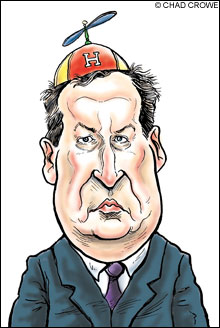 My dear Harvard students, administrators, faculty, and alumni:
My dear Harvard students, administrators, faculty, and alumni:
We find ourselves in what we academics call “a teachable moment.” A struggle is afoot for control of the soul of the academy — at Harvard and every other liberal-arts campus. Unfettered debate and inquiry are under grave assault.
From the outset, my tenure as Harvard’s president has been punctuated by a series of phony crises. Some of these episodes were blamed on my lack of personal sensitivity, others on my misconception of a university president’s role vis-à-vis the faculty. This is deeply troubling to me, not because my social reputation is at stake, but because something larger hangs in the balance: whether or not academic freedom will remain intact. I take seriously the duty bestowed on me, and I welcome robust criticism; reciprocally, I reserve the right, indeed the duty, to voice my unvarnished views about the directions in which I feel Harvard must move.
Let me recount a few of the more highly publicized events of my presidency thus far. It began with my calling into question Harvard’s hostile attitude toward the military in general and the university’s refusal specifically to allow ROTC on campus because of the military’s “don’t ask/don’t tell” policy — a policy that I personally find offensive and counter-productive. In the same speech, delivered as a personal guest sermon in Harvard’s tradition of encouraging members of the community to speak out on moral and ethical issues, I questioned whether calls for the university to disinvest in companies that do business with Israel were engaging in a hypocritical double standard that might be deemed “anti-Semitic in their effect, if not in their intent.” Faculty authoritarians revolted against my right to deliver my speech, yet I stand by what I said.
My spat with Afro-American-studies professor Cornel West — a private conversation leaked to the news media — likewise drew the spirited disapproval of my faculty critics. It was deemed insensitive, if not outright racist, for a university president to inquire whether a scholar should contribute more to the body of knowledge in his stated field than to rap music. Mind you, I like rap music and think it has a place in the cultural canon, yet I stand by what I said.
And then there were my remarks to a September 2004 conference on Native American studies at Harvard, in which I noted that significantly more indigenous people died not from the settlers’ weapons but from their pathogens. For stating this empirical fact, I was lambasted as insensitive to the plight of Native Americans and an apologist for colonialism — a genocide denier. I stand by what I said. Facts, it has been wisely said, are stubborn things.